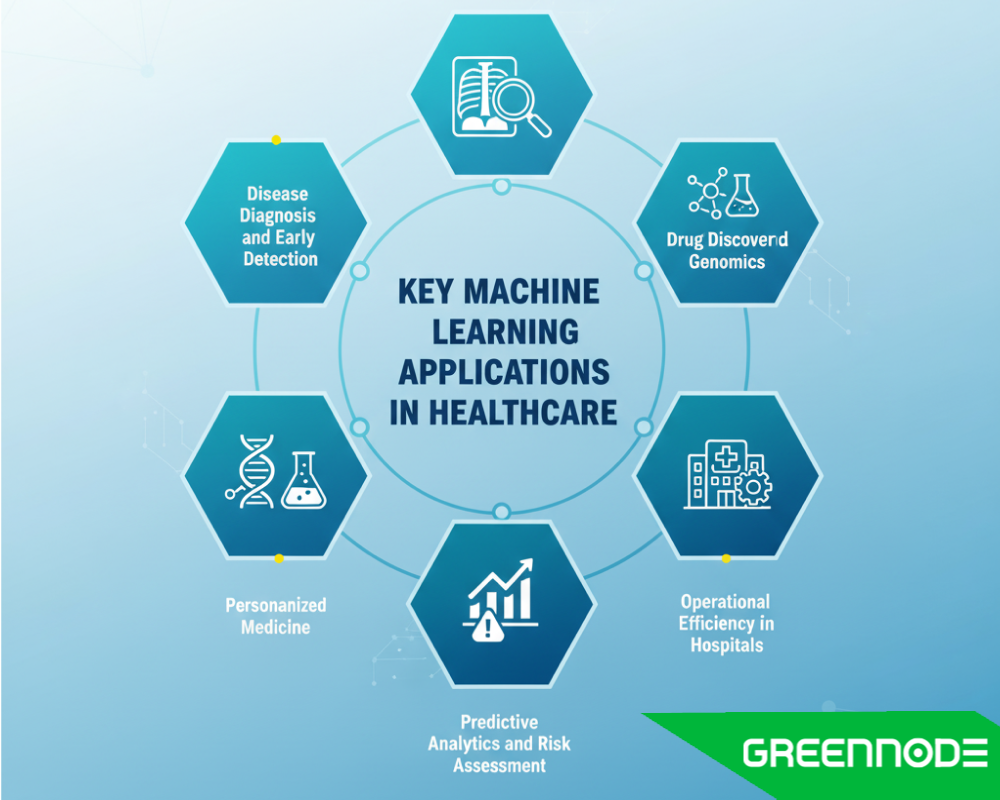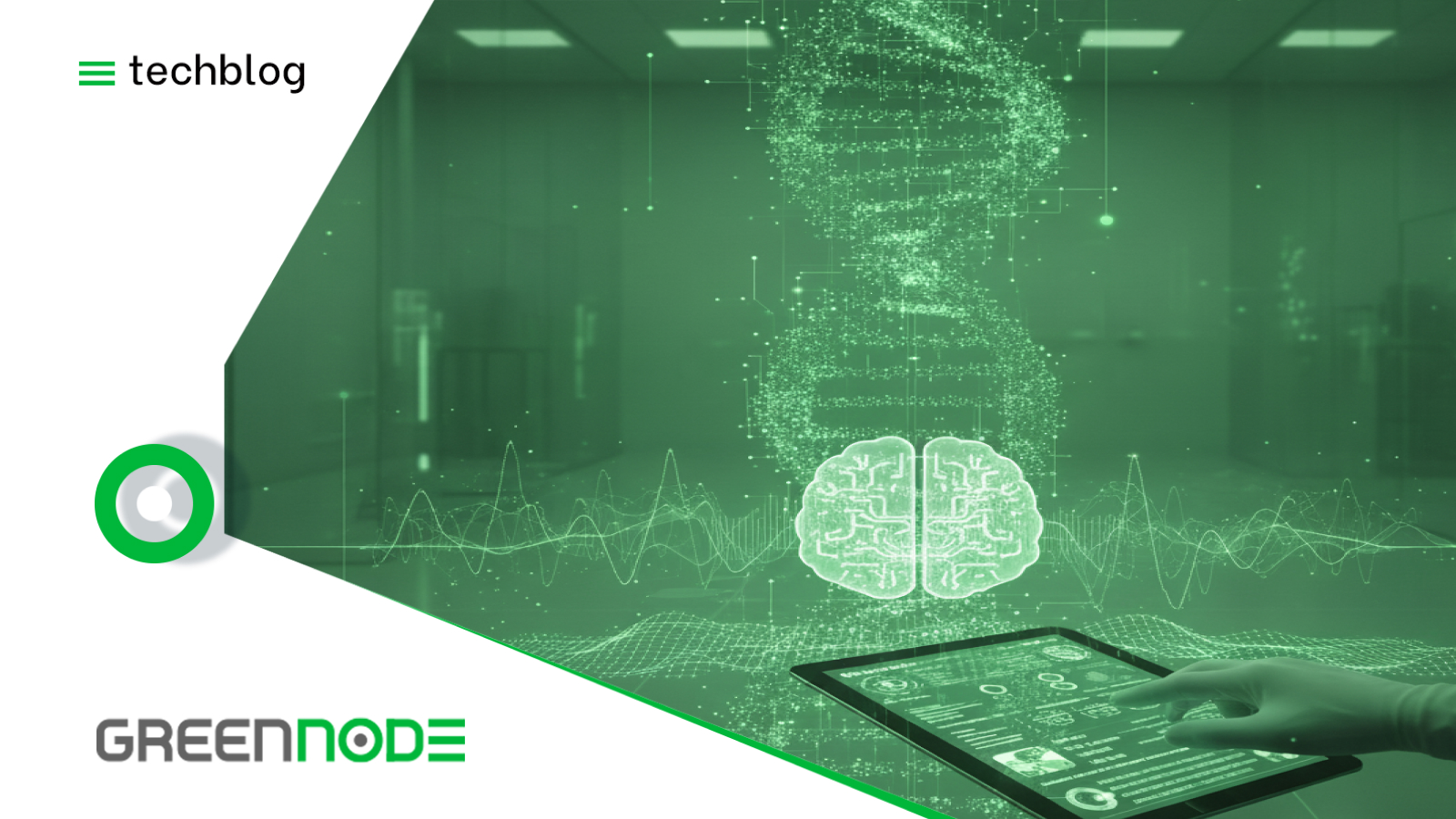As machine learning continues to redefine industries, healthcare stands out as one of the most powerful proving grounds for AI innovation. With vast, data-rich systems and high-stakes decisions, the field offers the perfect environment to demonstrate how machine learning models can accelerate diagnosis, improve outcomes, and transform clinical operations.
At GreenNode, we view machine learning in healthcare not just as a trend but as a benchmark for what’s possible when high-performance compute meets human-centered innovation. From predictive analytics to AI-driven drug discovery, ML-powered solutions are reshaping how the healthcare ecosystem processes data, makes decisions, and delivers precision care at scale. In this article, we’ll explore machine learning applications in healthcare and the benefits it delivers.
What is Machine Learning in Healthcare?
At its core, machine learning (ML) is a subset of artificial intelligence that enables computers to learn from data, recognize patterns, and make predictions without being explicitly programmed. In healthcare, these models are trained on massive datasets, from medical images and lab results to electronic health records, to uncover insights that would be impossible for humans to detect at scale.
Unlike traditional analytics, which depend on predefined rules, ML systems continuously evolve. Each new data point refines the model, improving its accuracy over time. This adaptability makes machine learning ideal for healthcare environments where conditions, patient variables, and treatment outcomes are constantly changing.
When supported by high-performance infrastructure like GPU clusters and AI-optimized cloud platforms, ML workflows in healthcare can train faster, analyze larger datasets, and deliver results in near real time. The result is more proactive decision-making, earlier disease detection, and a foundation for precision medicine at scale.
What are Key Machine Learning Applications in Healthcare?
The impact of machine learning in healthcare extends across every layer of the medical value chain, from research and diagnostics to patient engagement and operational efficiency. What once required years of manual work can now be automated, scaled, and optimized using high-performance AI compute.

Diagnostic Imaging and Disease
Detection Machine learning models trained on millions of medical images can identify patterns invisible to the human eye. In radiology, for example, deep learning algorithms now assist clinicians in detecting tumors, fractures, or cardiovascular anomalies with higher accuracy and speed.
Predictive Analytics and Early Intervention
By processing historical patient data, ML algorithms forecast health risks before symptoms appear. Hospitals use predictive models to anticipate patient deterioration, readmission rates, or outbreak trends, enabling early, preventive action that saves both time and resources.
Drug Discovery and Clinical Research
Machine learning accelerates drug development by predicting molecular behavior, identifying potential compounds, and optimizing clinical trial design. What previously took years of experimentation can now be simulated in weeks through GPU-accelerated computing environments.
Personalized Medicine
ML-driven systems analyze genetic data and medical histories to recommend customized treatments. This precision approach improves therapy outcomes while reducing adverse effects, marking a shift from generalized to individualized healthcare.
Hospital Operations and Workflow Optimization
Beyond clinical care, ML also streamlines administrative processes like scheduling, billing, and resource allocation. Predictive algorithms help hospitals manage staff, optimize supply chains, and enhance overall efficiency.
What is the Difference Between AI and Machine Learning in Healthcare?
Though often used interchangeably, artificial intelligence (AI) and machine learning (ML) play distinct but complementary roles in healthcare innovation.
AI is the broader concept, an umbrella term for systems designed to simulate human intelligence, reason through data, and make autonomous decisions. Machine learning, on the other hand, is a specific subset of AI focused on learning from data patterns to improve predictions and decision-making over time.
In healthcare, AI might encompass a full ecosystem of intelligent systems, from robotic surgery to virtual health assistants and medical imaging diagnostics, powered by a combination of ML, natural language processing (NLP), and computer vision.
Machine learning is the engine inside that ecosystem: the part that learns from vast amounts of patient data, refines its understanding, and powers the predictive accuracy behind AI applications.
In short, AI provides the framework, while machine learning delivers the precision. Together, they’re enabling healthcare providers to diagnose faster, personalize treatment, and operate with data-driven confidence, all accelerated by modern GPU-powered AI infrastructure.
Examples of Companies Utilizing Machine Learning
Machine learning now is a powerful subset of artificial intelligence, which is rapidly changing the healthcare landscape. Its promise lies in its ability to analyze massive volumes of complex data, leading to improvements across everything from diagnostics to administrative processes. By crunching large volumes of data, ML technology can help generate precise medicine solutions customized to individual characteristics.
To understand the breadth of this transformation, let’s explore three companies leveraging machine learning in fundamentally different areas of healthcare:
GRAIL: Revolutionizing Cancer Screening and Early Detection
GRAIL is tackling one of the greatest challenges in medicine: the early detection of cancer. The company focuses on developing solutions through a combination of genomics expertise and technology.
The Machine Learning Use Case:
The Galleri Test GRAIL developed the Galleri test, which focuses on identifying DNA fragments in patients' blood samples. The critical step involves the application of machine learning algorithms to determine whether the cells from which these DNA fragments originated are cancerous. This use of ML demonstrates how algorithms can analyze complex biological data to achieve highly sensitive diagnostic results, offering the potential for earlier cancer intervention.
Pfizer: Accelerating Drug Discovery and Research
Global pharmaceutical giant Pfizer is integrating machine learning and AI into its research pipelines to speed up the development of new treatments, particularly in complex fields like oncology. By combining ML with deep learning, researchers can develop models that more accurately predict successful drug molecules, thereby accelerating the entire drug discovery process.
The Machine Learning Use Case:
Immuno-Oncology Research Pfizer utilizes machine learning and natural language processing (NLP) in collaboration with IBM’s Watson AI technology for immuno-oncology research. Immuno-oncology studies how the body's immune system can fight cancer. This partnership allows Pfizer to analyze large amounts of patient data, leading to the development of faster insights for producing more impactful treatments for patients.
Tebra: Streamlining Operational Efficiency
While clinical applications often steal the spotlight, machine learning is also vital for improving the business and administrative side of healthcare. Organizations across the industry are using ML technologies to increase efficiency, which can lead to significant cost savings.
The Machine Learning Use Case:
Automating Administrative Tasks Tebra supports the technological and business needs of independent practices through its cloud-based clinical and business management platform, the Kareo product. This platform allows organizations to transfer patient health and financial data easily. Crucially, the Kareo product applies AI technology to automate repetitive tasks, such as managing records and completing transactions. This automation cuts down on operational costs and time for practitioners, empowering healthcare workers to focus their attention on more urgent matters of patient care
These examples, spanning diagnostics, research, and operations, illustrate that machine learning is a fundamental tool for solving complex healthcare problems. By helping to make sense of the massive amounts of data generated daily in electronic health records (EHRs), ML algorithms are set to enhance efficiency, accuracy, and personalization, paving the way for a more compassionate and effective healthcare system.
How Can GreenNode’s GPU Cloud Accelerate AI Workloads?
As AI adoption accelerates across industries, the real challenge isn’t building models, it’s running them efficiently at scale. That’s where GreenNode GPU Cloud comes in.
Built for performance-intensive AI workloads, GreenNode provides enterprises and research teams with the computing power needed to train, fine-tune, and deploy complex machine learning models faster and more reliably. With access to cutting-edge NVIDIA GPUs like the H100 and L40S, organizations can handle everything from large-scale model training to low-latency inference with ease.
Whether you’re developing diagnostic models, generative AI systems, or advanced analytics, GreenNode delivers the infrastructure, scalability, and flexibility to move seamlessly from experimentation to production.
Our mission is simple: to empower your AI innovation with the speed, stability, and intelligence that modern workloads demand.
FAQs About Machine Learning in Healthcare
1. What is machine learning in healthcare?
Machine learning in healthcare refers to the use of algorithms that can analyze complex medical data, identify hidden patterns, and make predictions to support clinical decision-making. These models continuously improve as they process more data, helping healthcare providers diagnose diseases faster, predict patient outcomes, and deliver personalized treatments.
2. How is machine learning used in healthcare?
Machine learning is applied across many healthcare workflows — from medical imaging and diagnostic tools to drug discovery and hospital operations. It enables systems to detect early signs of disease, optimize patient care plans, and automate repetitive administrative tasks. When deployed on high-performance GPU infrastructure, ML models can process large-scale medical datasets in real time with higher accuracy.
3. What are the benefits of machine learning in healthcare?
The benefits include greater diagnostic precision, reduced human error, faster drug development, and improved patient outcomes. Machine learning also enhances hospital efficiency by automating workflows and enabling data-driven resource management. Overall, it empowers healthcare organizations to move toward smarter, more predictive, and personalized care delivery.
